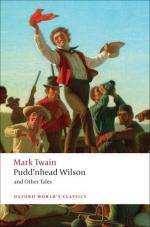I will anticipate here sufficiently to say that we did learn to ride, after some days’ practice, but never well. We could not learn to like our animals; they were not choice ones, and most of them had annoying peculiarities of one kind or another. Stevens’s horse would carry him, when he was not noticing, under the huge excrescences which form on the trunks of oak-trees, and wipe him out of the saddle; in this way Stevens got several bad hurts. Sergeant Bowers’s horse was very large and tall, with slim, long legs, and looked like a railroad bridge. His size enabled him to reach all about, and as far as he wanted to, with his head; so he was always biting Bowers’s legs. On the march, in the sun, Bowers slept a good deal; and as soon as the horse recognised that he was asleep he would reach around and bite him on the leg. His legs were black and blue with bites. This was the only thing that could ever make him swear, but this always did; whenever the horse bit him he always swore, and of course Stevens, who laughed at everything, laughed at this, and would even get into such convulsions over it as to lose his balance and fall off his horse; and then Bowers, already irritated by the pain of the horse-bite, would resent the laughter with hard language, and there would be a quarrel; so that horse made no end of trouble and bad blood in the command.
However, I will get back to where I was—our first afternoon in the sugar-camp. The sugar-troughs came very handy as horse-troughs, and we had plenty of corn to fill them with. I ordered Sergeant Bowers to feed my mule; but he said that if I reckoned he went to war to be dry-nurse to a mule, it wouldn’t take me very long to find out my mistake. I believed that this was insubordination, but I was full of uncertainties about everything military, and so I let the thing pass, and went and ordered Smith, the blacksmith’s apprentice, to feed the mule; but he merely gave me a large, cold, sarcastic grin, such as an ostensibly seven-year-old horse gives you when you lift his lip and find he is fourteen, and turned his back on me. I then went to the captain, and asked if it was not right and proper and military for me to have an orderly. He said it was, but as there was only one orderly in the corps, it was but right that he himself should have Bowers on his staff. Bowers said he wouldn’t serve on anybody’s staff; and if anybody thought he could make him, let him try it. So, of course, the thing had to be dropped; there was no other way.




